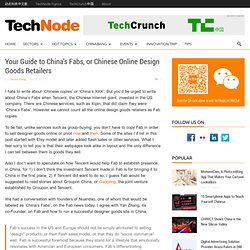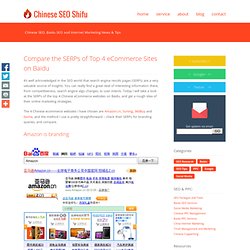

Your Guide to China’s Fabs, or Chinese Online Design Goods Retailers. I hate to write about ‘Chinese copies’ or ‘China’s XXX’.

But you’d be urged to write about China’s Fabs when Tencent, the Chinese Internet giant, invested in the US company. There are Chinese services, such as Xipin, that did claim they were ‘China’s Fabs’. However we cannot count all the online design goods retailers as Fab copies. To be fair, unlike services such as group-buying, you don’t have to copy Fab in order to sell designer goods online or pivot now and then. Some of the sites I’d list in this post started with Etsy model and later added flash sales or other services. Also I don’t want to speculate on how Tencent would help Fab to establish presence in China, for 1) I don’t think the investment Tencent made in Fab is for bringing it to China in the first place, 2) if Tencent did want to do so, I guess Fab would be suggested to read stories about Groupon China, or Gaopeng, the joint venture established by Groupon and Tencent.
Chinese Shopping Search Engine TaoTaoSou Finds Huge New Funding Round. China e-commerce industry is worth close to $200 billion this year in terms of sales. Inevitably, all those e-shoppers need some guidance – and perhaps some useful price comparisons – without jumping from website to website. One such handy shopping search engine (and perhaps the best-looking of the bunch) is TaoTaoSou . The search startup has revealed today that it now has series B funding to help it grow from CDH Investments and DT Capital. The value of this new round hasn’t been revealed, but TaoTaoSou now has a grand total of $20 million in funding from two major series plus seed-stage.
TaoTaoSou’s name is deliberately evocative of Alibaba ’s iconic Taobao shopping site. There are certainly plenty of shopping search options in China. TaoTaoSou does some clever stuff that most of its rivals do not, such as searching from uploaded pictures (to help you find a style you saw on the web), and letting users save a ‘fashion collection’ of images. Taobao and Sina Weibo are Testing A Marketing Service for Online Retailers.
Alibaba’s Taobao is testing a service for online retailers to do marketing on Sina Weibo, according to Erun, an online e-commerce news site (in Chinese).

Taobao retailers then can send marketing messages or other content directly to Sina Weibo from the Tabao system, or interact with Sina Weibo user directly. Taobao told Erun that they hoped it to help convert retailers’ followers on Sina Weibo into their customers. Now a batch of selected retailers selling female clothing and cosmetics are testing the product. Other retailers, however, also can apply for it. Apart from operations, the selection also takes the number of Sina Weibo followers, the store’s presence on Sina Weibo and whether a retailer uses Wangwang — the instant messaging tool provided by Taobao for retailers to communicate with consumers — into consideration. Why Don't More Chinese Internet Companies Expand Overseas? China Beats the US as World's Top E-Commerce Market (CHARTS) With China’s e-commerce market set to be worth nearly $300 billion this year, 2013 will mark the watershed moment when China surpasses the US to become the world’s top e-shopping market.
Looking at data from Forrester Research and iResearch for the two nations, Chinese netizens will collectively spend an estimated $296 billion in the whole of 2013, while US e-shoppers will spend $252 billion. Here’s the pattern of growth: The chart is from a new report on luxury e-commerce in China by Washington-based Observer Solutions . Of course, China’s succession is an inevitable progression as China’s realistic, addressable e-commerce market grows to the point of nearly exceeding the entire population of the US. Indeed, the same report states that the penetration of online shopping in China hit 42.9 percent in 2012 so that the country had 242 million e-shoppers last year. In 2012, the average Chinese online consumer spent RMB 5,203 ($840), up 25 percent from 2011. Compare the SERPs of Top 4 eCommerce Sites on Baidu. It’s well acknowledged in the SEO world that search engine results pages (SERPs) are a very valuable source of insights.

You can really find a great deal of interesting information there, from competitiveness, search engine algo changes, to user intents. Today I will take a look at the SERPs of the top 4 Chinese eCommerce websites on Baidu, and get a rough idea of their online marketing strategies. The 4 Chinese ecommerce websites I have chosen are Amazon.cn, Suning, 360Buy and Gome, and the method I use is pretty straightforward – check their SERPs for branding queries, and compare. Amazon is branding It’s pretty obvious that Amazon is working hard to promote their new single-letter domain “z.cn”. Another thing to note is that Amazon integrates Sina Weibo to the SERP, so users can follow their official Weibo account right from the SERP.